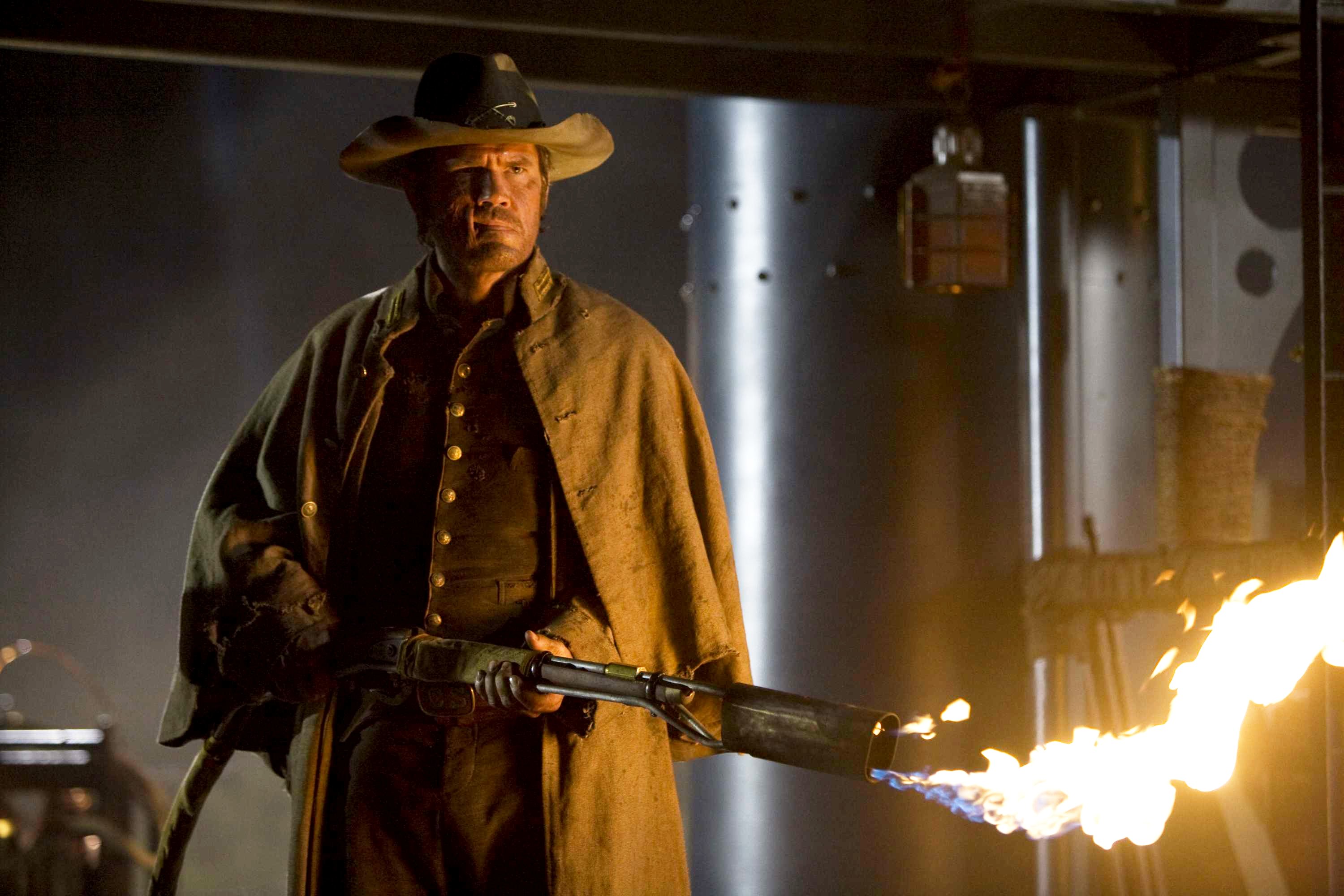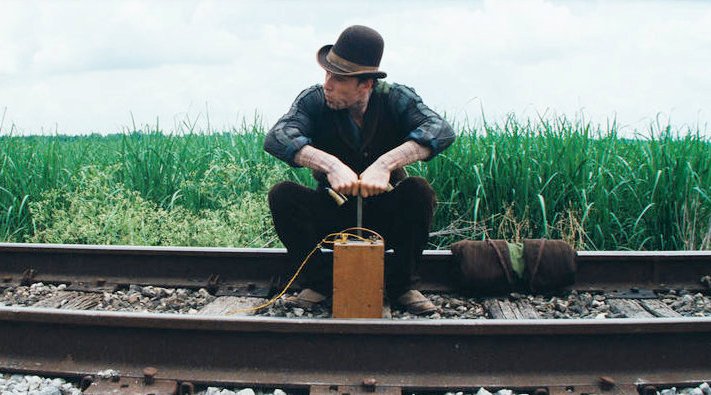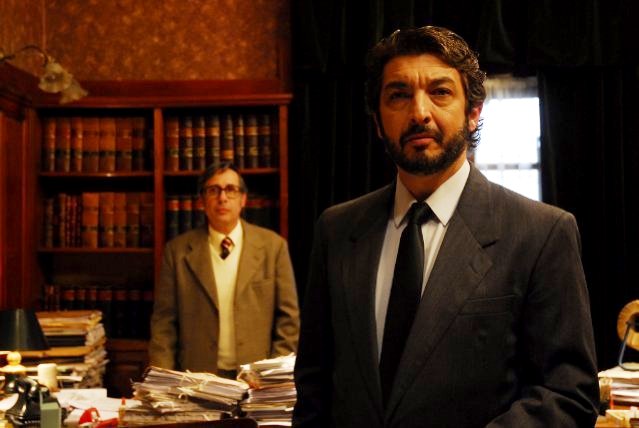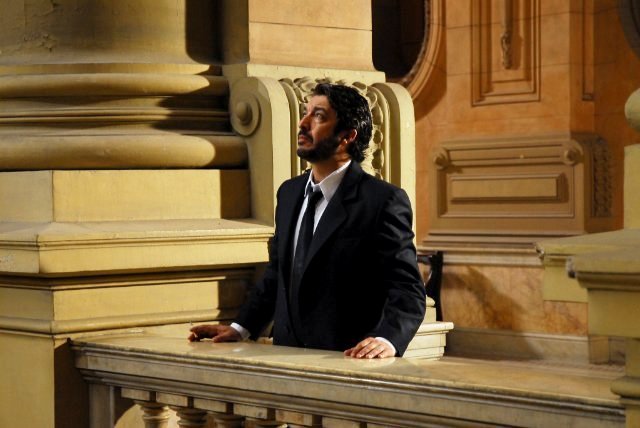“I’m not actually playing Lincoln now. I was attached to it for a while, but it’s now I’m past my sell-by date.” Along the lines of Guillermo del Toro leaving The Hobbit, Liam Neeson announces he’s now off Stephen Spielberg’s long-rumored Lincoln biopic, mainly because it’s taken too long to get off the ground. (Neeson was first rumored for the role in 2005.) Well, that’s too bad. But, if it takes another decade or so to move, Adrien Brody should fit in nicely.
Category: History
West Virginia Granite (This Byrd has Flown.)

“Mr. Byrd…said he had no illusions that his oratory was going to change the outcome of the final vote. So why was he on the floor day after day? What was he accomplishing? ‘To me, that question misses the point, with all due respect to you for asking it,’ he said. ‘To me, the matter is there for a thousand years in the record. I stood for the Constitution. I stood for the institution. If it isn’t heard today, there’ll be some future member who will come through and will comb these tomes.‘”
Senator Robert Byrd, the longest-serving member of Congress in American history, 1917-2010. Known as a fierce defender of Senate prerogative and a legislator with a penchant for pork, Senator Byrd, we all know, held some indefensible positions in his day. But at least he got on the right side of history before his time came. Rest well, Senator.
Cowboy Junk-y.

I highly doubt any compadres and comadres out there need me to tell them at this late date that Jimmy Hayward’s loud, dumb, Hoobastank-ish adaptation of DC’s Jonah Hex is, all things considered, a lousy film. So, to be clear right up front: In no way am I recommending that anyone actually sit through the durned thing, especially if your own money is involved. But, I am forced to admit: While I may have just been in a summer-afternoon, World Cup-enhanced good mood at the time, I actually found Jonah Hex to be a pretty entertaining lousy film, if you set your brain to numb and roll with it.
For, however defiantly stupid Hex is for most of its run, and yes, Hex is extremely, flagrantly stupid — we know that from the horse-mounted howitzers in the first reel — at least the movie is aware enough of its drive-in badness just to let its Weird Western Tales freak flag fly. (Speaking of Hex’s comic book origins, the obligatory source material disclosures: I’ve been aware of the character since he popped up in the Crisis way back when, but never really followed him, even when he got sent into the far-flung future for some reason, and I couldn’t tell you much about Hex beforehand except the scar.)
So basically, I found Jonah Hex to be on the bizarrely-enjoyable, “TNT New Classic at two in the morning” side of terrible, as opposed to the just-plain-irritating-terrible of, say, 1999’s The Wild, Wild West. (Or, to take two recent examples, Alice in Wonderland or Clash of the Titans.) True, gun-for-hire John Malkovich seems really bored as this twisted tale’s Big Bad, Confederate general Quentin Turnbull. (Like Hugo Weaving in The Wolfman, another genre turn I thought would have to be fun no matter what, Malkovich is a letdown. Even in other easy paychecks like Con Air, I’ve never seen him so listless.) But the Malkatraz choosing to phone-it-in notwithstanding, there’s still a lot of goofy fun at the fringes of Jonah Hex.
I mean, we’ve got rising star Michael Fassbender (of Inglourious Basterds, Fish Tank and, soon X-Men: First Class — He’s the Magneto to James McAvoy’s Professor X) as a jolly, lilting Irish-immigrant henchman in a bowler hat. There’s Will “Gob Bluth” Arnett playing it straight as a McClellan-esque Union general, Jeffrey Dean Morgan (of Watchmen and The Losers) as a wordy and depressed zombie, Lance Reddick (nee Major Cedric Daniels) slumming it as Hex’s Q, American Beauty‘s since-AWOL Wes Bentley randomly popping up very briefly as Southern Gentleman #2…and that’s not even getting into the random Civil war-era gladiatorial bat-beasts and whatnot.
And then there’s Hex himself: Josh Brolin, who, not unlike Adrien Brody and Sarah Polley in Splice, carries the stoic deadpan — with a glint of laughter in the eyes — of a man who seems to be in on the joke. If nothing else, Brolin — after spending two decades not-really-making-it between 1985’s The Goonies and 2007’s No Country for Old Men — seems to be getting a real kick out of being an A-Lister carrying his own B-level comic book film. For her part, Megan Fox is not much to write home about here, but she’s easy on the eyes and acquits herself well enough. I know she’s often a target of many people’s weirdly vociferous wrath. But I’ll give Fox this: If Hex and Jennifer’s Body are any indication, she seems to have a pretty solid sense of her own limited range.
Now, you’ll notice I’ve gone several paragraphs in now without mentioning anything involving the actual story, and that should give you a sense of its quality. But, basically, Hex wants revenge on the aforementioned Gen. Turnbull, since he’s the man who disfigured him (good work, make-up people), murdered his family before his eyes, and inadvertently gave Hex the power to commune with the dead (although, apparently not with his family, which is where you’d think he’d then spend most of his time.) Turnbull, meanwhile, wants to level the Union on its 100th anniversary, as payback for that whole Civil War thing — you may have read about it. (The engine of his centennial-obliterating master plan are highly dangerous WMD, apparently once engineered by Eli Whitney — In practice, they’re glowing golden orbs not unlike the pinkish bombs Jar Jar et al were flinging around Naboo in The Phantom Menace. And, yes, the fact I just mentioned Episode 1 should again give you a sense of what you’re in for here.
So, yeah, the film is bad, no doubt. But I still definitely enjoyed myself through its schlocky-grisly awfulness. If you’ll allow me to explain by digression: Speaking of John Lee Hancock’s amiable but slightly dull adaptation of The Alamo in 2004, I finished up by saying of Billy Bob Thornton’s Davy Crockett that “Billy Bob is so good here that I spent most of the film contemplating who else I’d cast alongside Thornton for the definitive American History miniseries. Christopher Walken as 1850 Henry Clay? Fred Thompson as James Buchanan? Adrien Brody as Mexican War-era Lincoln? The possibilities are endless.”
And, with that in mind, I think the point where Hex sorta sold me as Z-grade entertainment, despite its pretty unmitigated badness otherwise, is when Aidan Quinn (most recently playing a drunk-of-a-different-color in The Eclipse) shows up as President Ulysses S. Grant, a man who needs that outlaw and ex-Confederate rapscallion Jonah Hex on the side of God and country, his dirty deeds be damned, or else. If you’ve been coming ’round these parts and reading the movie reviews for any amount of time, you’ve probably noticed I have a weakness for both historical recreations and genre outings. Well, however much of a bomb in the end, Jonah Hex at least has the good sense to frolic happily at that crossroads for awhile.

A Revolutionary Dancer?
“She knew that her husband was gun-running, she knew that he was accompanied by rebels and at one point she used her yacht to decoy government boats and aircraft away from the direction which her husband was taking.” The Dancer Upstairs? Newly-released documents suggest ballerina legend Margot Fonteyn was more active in a failed Panamanian coup than anyone knew at the time. Said Foreign Office Minister John Profumo (later of the Profumo scandal): “I had to pinch myself several times during her visit to be sure I wasn’t dreaming the comic opera story which she unfolded.”
Nothing New Under the Burning Sun.
“‘This world is a strange madhouse. Currently, every coachman and every waiter is debating whether relativity theory is correct. Belief in this matter depends on political party affiliation.’ So wrote Albert Einstein in a letter to his one time collaborator, the mathematician Marcel Grossmann in 1920.“
A recent history-of-science paper by a Jeroen van Dongen of Utrecht University looks into the anti-relativity theory movement of the 1920’s, and how it compares to today’s climate change denialism. “Anti-relativists were convinced that their opinions were being suppressed. Indeed, many believed that conspiracies were at work that thwarted the promotion of their ideas.” (See also: Evolution and Scopes.)
Counting Sheep.

Baaa. Baaaa. Baaaaaaa. Baa. BAAAAAAAaaa. Baaaaaa. BAAAAAA! Baaaa….BaaaaAAA. BAAAAAA. baaaaa. baaaaAAAAA. Baaa. baaaAAAAA. baaaaaa. baaaaA. BAA. Baaaaa. baAAAAaaaaa. Baaaaaa. Baaa. Baaa. Baaa…BAAAAAAAAAA. baaa. (baaaaAA.) BAAAAAAA. BAAAAAAA! baa. baaaa. baaaaa. baaAAAA? BaaaAAAA? BAAaaaa. Baa. Baaaa. BaaaaaAA. BAAAAA. [Spoiler: Highlight to Read:] Baaaaaaaa!
And so on. Judging from the generally positive reviews, I went into Lucien Castaing-Taylor’s pretty but painfully slow sheepherding documentary Sweetgrass expecting a languid, contemplative rumination on the ancient but fading bonds between Man and Beast. And I guess that’s basically what I got. But, at the risk of seeming like a Philistine, trust me: You really can’t overestimate how slow-moving this picture turns out to be. Sweetgrass has images of undeniable beauty, sure, but I thought its reach far exceeded its grasp. And, while obviously different movies work for different people, some of the ridiculous praise Sweetgrass is getting — “the first essential movie of this young year,” for example (Manohla Dargis, NYT) — has a definite “Emperor’s New Clothes” feel to it.
Billed as “the last ride of the American cowboy” (as in Brokeback Mountain, by cowboy they mean sheepherder), Sweetgrass chronicles the final time a flock was taken into Montana’s Absaroka-Beartooth mountains for summer pasture on a federal grazing permit, in 2001. It seems like an arduous undertaking, and no mistake — Two men have to corral hundreds of sheep on a journey through forests, across creeks, and up and down steep mountainsides, with only some horses and a few dogs to help them. (Speaking of which, I imagine Berk would’ve loved this flick.) But, just because a job is hard doesn’t necessarily make it compelling for motion picture purposes. And, as a film, Sweetgrass loses the thread in them there hills.
The movie works best in its opening half-hour or so, when the long, uninterrupted takes of sheep and shepherd behavior still seem like a novelty. The herd is shorn, the herd is fed (from a big wheel of grass, basically), the herd reproduces, the herd is driven through the streets of a small town to start its great grazing adventure. All pretty interesting. But, once Swetgrass gets into the actual drive into the mountains, we’re already pretty much inured to strange sheep behavior and the crazy fluid dynamics of the herd, and there’s not enough other story to sustain the enterprise. So after awhile, you just sit there, waiting for something — anything! — to happen: Demon sheep? Killer sheep? Even just a Black Sheep, maybe? Nope, sorry. Instead, we sit through extended shots like “Sheep being Sheep,” “Man Getting on Horse,” “Man Setting Up Tent,” “Sheep Still Being Sheep,” “Man Eating Bacon,” “Sheep Even Still, Not Surprisingly, Being Sheep,” and “Man Complaining about Sheep Being Sheep.” (Yes, I was reminded of this Onion classic.) There’s not much there there.
I say “Man” because, in a Cormac McCarthy-esque flourish, the film never really introduces us to the two shepherds on this drive. Presumably, this was to add to the “ancient natural rhythms” feel of the film — man, dog, horse, and sheep engaged in a millennia-old ritual or somesuch. The problem is, neither of this pair are engaging or particuarly easy to relate to. (Earlier, a sheephand at the farm gets off a good joke about “cowboy brains,” but unfortunately he’s not on the Big Trip.) The elder fella on the drive has a certain whos-more-grizzled je-ne-said-quoi, I guess, but he’s a mumbler with a maddening tendency to repeat himself over and over and over again. (Did I mention he repeats himself? He repeats himself.) And the other guy, who gets less screen time, probably ends being even worse to hang around with. At one point late in the film, he throws what can only be called an epic hissy fit — screaming vulgarities at sheep and calling his mom to whine about his predicament. I get it, it sucks. You’re still on camera, buddy.
Speaking of getting it, I know what the counterargument to my dismissal here is — As the Boston Globe‘s Ty Burr puts it, Sweetgrass is arguably “about the death of a particular sense of time: slow, profoundly observant, in tune with the larger cycles of nature…If you’re used to the ADD pace of modern filmmaking, ‘Sweetgrass’ will probably drive you crazy. If you can adjust, it could widen your soul.” Well, ok, I plead guilty to ordinarily being a souped-up, Twitter-happy, multi-tasking, Red Bull achiever. And, when it comes to spending my entertainment dollar on discourses about the Death-of-the-West, I highly prefer Red Dead Redemption (or, for that matter, books like Richard White’s It’s Your Misfortune and None of My Own) to plodding docs like this. But I also feel like I have a higher-than-normal curiosity about the world, and I don’t think I have the attention span of a hummingbird either. And, despite my best efforts, I was just not feeling this film. To be honest, some of this “you can’t handle a slower rhythm” talk feels like an attempt to make Sweetgrass critic-proof.
As it is, Sweetgrass would’ve probably made for a great one-hour National Geographic documentary or an episode of Dirty Jobs. And, as a “thick-description” anthropological study of a sheep drive, it probably has its merits too. But, as a full-length movie, though, it leaves much to be desired. On the bright side, its glacial pace and studied solemnity actually sent me into 21 Grams-style chuckling fits after awhile, and everyone in the theater got a good laugh at the sheephands onscreen snoring in unison with the guy in the front row. Counting sheep, indeed.

Justice is Closed (To You, Anyway).

“All across Washington, the doors, terraces and plazas of our essential public buildings have been closed off to the public, likely forever. But the closing of this front door, which will now be used only for exiting the building, is not just another front door lost to paranoia. It is the loss of what may be the nation’s most important portal.“
In the WP, architecture critic Phillip Kennicott lambasts the Supreme Court for closing its front doors in fear of the Big Bad Terr’ists. “The justices, with Stephen G. Breyer and Ruth Bader Ginsburg dissenting, have made their priorities known, as clearly as if they had they had sold naming rights to the Great Hall to the highest corporate bidder. They stand on the side of security — a regime of absolute and irrevocable decisions often made by unelected officials and not subject to any meaningful public appeal. Beauty, architecture and the need for a democratic people to experience inspiring symbolic public space weigh lightly, if at all, in the scales.” (See also Paul Goldberger’s similar case in The New Yorker.)
His Kingdom for a Horse.
“In 1914, Joey, a beautiful bay-red foal with a distinctive cross on his nose, is sold to the army and thrust into the midst of the war on the Western Front. With his officer, he charges toward the enemy, witnessing the horror of the battles in France. But even in the desolation of the trenches, Joey’s courage touches the soldiers around him and he is able to find warmth and hope. But his heart aches for Albert, the farmer’s son he left behind. Will he ever see his true master again?“
Uh…ok. What’s wrong with the Lincoln biopic again? With Tintin in heavy post-production, Steven Spielberg announces his next film will be the WWI equine epic War Horse, based on the 1982 novel by Michael Morpurgo. Guess it must be an amazing novel.
Forget It, Jake. It’s Buenos Aires.

At once a police procedural, political thriller, chaste love story, and remembrance of days past, Secret is a hard movie to categorize, but Dana Stevens’ concise summary at Slate — “Imagine a really long, really awesome episode of Law & Order set in Buenos Aires” — is a pretty good start. The thing is, Law & Order in Argentina, particularly ’round the time of the Dirty War, isn’t as black and white as it usually is in our 42-minute visits to the island realm of Jack McCoy and Adam Schiff. In Buenos Aires, as in life, everything gets complicated.
So, how to explain Secret? Well, I was reminded occasionally here of David Fincher’s Zodiac, in that the lingering case at the heart of the story drives some of our characters slightly mad. (The difference being, here an eventual resolution brings little comfort — There are still guilt, complicity, and consequences to contend with.) There’s a bravura sequence in a futbol stadium in the middle going which recalls some of the extended-shot marvels of Alfonse Cuaron’s Children of Men. There’s definitely some of The Wire‘s workingman’s blues and gallows humor here, and and as one of my friends noted, there’s also a good bit of The Remains of the Day in this story too. Taken as a whole, Secret moves to its own unique rhythm, and it is a film that’s definitely worth catching.
The tonal ambiguity of Secret is reflected in the opening moments, as we first meet Benjamin Esposito (Ricardo Darin) — a recently retired ex-lawyer now settling into the writing life — going through the author’s quandary of figuring how to start the book on his brain. First we see and hear that tired romantic cliche, a sad parting at a train station, and a lover chasing down the train. Wait, scratch that. Let’s start with a final breakfast together with the lost lover, and all the details — the honey, the fruit, her floral-print dress, her sun-dappled smile — that can now never be forgotten. No, that’s not it either. So Benjamin falls back to the case file and we witness some brief and dreadful moments in a brutal, bloody rape/homicide. Ugh. That’s no way to start this tale.
Still struggling with his opening chapter, Benjamin visits his old friend and colleague Irene (Soledad Villamil), now a judge in Buenos Aires, who is not particularly enthused to hear that he’s decided to reopen old wounds and write about the tumultuous Morales case. Nonetheless, she gives him an old typewriter (with a broken A) and some excellent advice — Start with what you remember best. And so he does. And soon we find ourselves thirty years in the past, in the small, paper-strewn offices of Ben, Irene, and their semi-functioning alcoholic co-worker Sandoval (Guillermo Francella), just before they pulled the case that transformed their lives.
Particularly by L&O standards, the whodunit aspect of the story is not all that baroque (although it does rely on some potentially clever, potentially dubious po-lice work that helps give the film its name. While I’m on the subject, there’s some implausibly successful good-cop, bad-cop interrogating later on that took me out of the film.) Instead, our investigative trio has much more trouble finding, catching, and holding on to their man after they’ve made him. After all, Argentina between 1976 and 1983 is a slippery place — down is up and up is down, and searching for criminals is no longer a very safe pastime once the criminals are in charge…
I said in my review of Jacques Audiard’s A Prophet that “if The Secret in Their Eyes is better, it must be really something.” And, while I think I ever-so-slightly preferred A Prophet in the end — due to the earlier noted implausibilities here, and because this film’s various acts sometimes feel disconnected from each other– my strong advice is: See them both! A Prophet is a young man’s movie, a coming-of-age, learning-the-ropes story of an ascent into power, while Secret is an older man’s tale, a wistful look back at earlier times and the mistakes, regrets, and chance circumstances that haunted a life. And along with Red Riding, Ellsberg, Terribly Happy, and Kick-Ass, they’re both at the top of my 2010 list so far.

“Law & Order: Civil War Unit.”
“Redford says he didn’t want to simply re-create Lincoln’s assassination and deals with that mainly as setup. ‘All the President’s Men was very similar, because you had this big historical event taking place, but what people didn’t know was what these two reporters did, digging in under the radar. You didn’t need to show Nixon a lot,’ he says.“
USA Today checks in on the set of Robert Redford’s The Conspirator, about the trial of Mary Surratt, with Robin Wright Penn, James McAvoy, Toby Kebbell, and Alexis Bledel. (This is not to be confused with the long-gestating film adaptation of Manhunt or Steven Spielberg’s seemingly cursed attempt at a Lincoln biopic.)
